Focus and Scope
Wimb Lu, is an academic and scientific journal of national and international character, visible on the web since 2005. It publishes unpublished articles of investigation, theoretical analysis in the area of psychology and related subjects to this discipline. Accepts scientific articles, theoretical essays, sistematization of experiences and reviews, in the understanding that they have high quality and investigative content.
It is aimed at professionals in psychology, students, teachers, national and foreign interested in the scientific academic writing of an indexed journal. The articles are reviewed by external peers, double blind system, to ensure their scientific rigor.
Objective
Publish inedit and original articles by research, theoretical and professional analysis about ¨Psychology and Social Sciences, to contribute to expand national and knowledgment in this areas.
Publication frequency (periodicity)
Wimb lu has a continuous periodicity organized in two issues per year that cover the months of January to Juan and July to December. It is published on the first day of the beginning of the period (January 1st, July 1st) and the articles that are aproved are continuously published until the issue closes.
Indexes, databases, directories, search engines and repositories
Wimb Lu is included in several indexes, databases, directories, search engines and repositories:
Latindex, REDALYC,DOAJ, ERIH PLUS, Dialnet, CLASE, REDIB, Biblat, BASE, COPAC, Ulrich´s Web Global Serials Directory, Ebscohost, Sudoc Catalogue, CIRC, REBIUN, LatinREV, Sherpa Romeo, MIAR, Google Scholar, Google Analytics, IRESIE, Repositorio La Referencia, Crossref, AURA AMelica, Journals for Free
Peer Review Process
Articles of any scientific theory or methodology are accepted as long as they are approved by external double blind pair review, as befits this type of publication.
Wimb lu accepts for possible publication empirical articles on any topic or methodology related to the psychological discipline, as well as theoretical essays, literature reviews, case studies, clinical case studies and systematizations of experiences. All documents are reviewed by external peers in a doble-blind system.
Once the article is received, the author is notified that he will undergo a review process by at least two external evaluators. If there are discrepancies in criteria, a third external evaluator is used.
Within a period of 4-6 weeks, the author is notified again of the result of the evaluation (accepted, accepted with observations, rejected). Subsequently, the evaluation process can be repeated if necessary.
Neither the author nor the evaluator knows the identity of each one, to meet the double blind pair criterion in the review process.
If there are discrepancies of criteria between evaluators, Editorial Board can make final decision about the article evaluated.
In the link below is the evaluation guide for reviewers:
Average time between submission to publication of the articles is of 6-8 months.
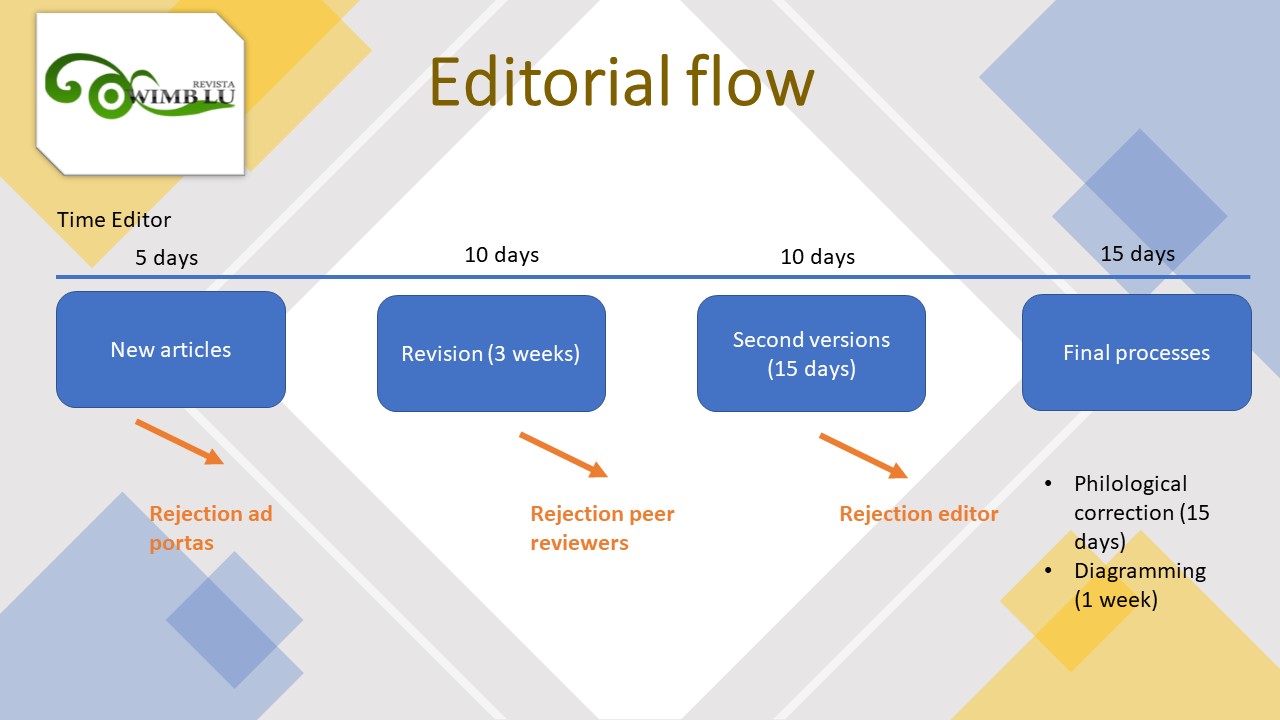
Submission Preparation Checklist
As part of the submission process, authors are required to check off their submission's compliance with all of the following items, and submissions may be returned to authors that do not adhere to these guidelines.
- The petition has not been previously published, nor has it been submitted to another journal (or an explanation has been given in Comments to the editor).
- The file sent is in OpenOffice, Microsoft Word, RTF, or WordPerfect format.
- Web addresses have been added for references where possible.
- The text has simple line spacing; the font size is 12 points; italics are used instead of underlining (except URLs); and all the illustrations, figures and tables are inside the text in the corresponding place and not at the end of the whole.
- If you are sending to a peer-reviewed section of the journal, you have to make sure that the instructions in Ensuring a blind review)) had been followed.
Open Access policy
This journal provides immediate free access to its content under the principle of making research available to the public free of charge, which fosters a greater exchange of global knowledge. The subscription and sending of articles to the journal has no cost to the author.
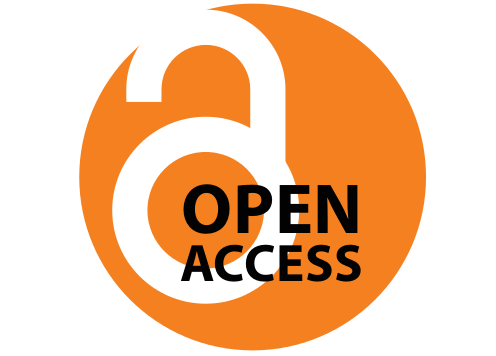
Plagiarism detection Policy
This policy refers to the control over the ethics of the publication. The Management of the Journal will ensure that the Editorial Committee, the review team and authors comply with the ethical standards necessary in the publication process.
To detect plagiarism, it uses tools such as Google and Duplichecker.
List of free plagium detectors:
Plagium: https://www.plagium.com
Plagiarism Checker: https://plagiarismdetector.net/
Viper: https://plag.com
Dupli Checker: https://duplichecker.com/es
Plagiarism detection will be done before submitting the article for external peer review. The text is checked and the editor and editorial asistant corroborate the correct citation of the sources and make a manual evaluation too.
There are some implications for the authors if plagiarism is detected. These depends on the type of plagiarism. For example: If the article is not original and was previously published in another indexed journal, it will be withdrawn from editorial process with a notification to th author. If plagiarism or ideas from cited authors is found, it is evaluated whether it is a simple omission of citation, in that case, the author is notified to correct that omissión inmediately. If it is a large amount of plagiarism text without citation, the article will be rejected and withdrawn from editorial process with the proper official notification. If omission of self-citation of the author is detected, the proper citation and bibliographic reference will only be requested if it is a previous research that is part of the current one. The Editorial Board evaluates all situations and gives a veredict according to the conditions in which plagiarism occurs and the moment in which the article is in the editorial process when it is detected.
As general provisions, it is established that:
- All articles sent to the journal Wimb lu must be original and unpublished. It must be of own authorship and distinct from any other document previously published by the same author (a) or that is under review in another journal or publication medium.
With the submission each author (a) must declare the originality and the assignment of the right of publication and non-commercial distribution in the journal, guaranteeing that the text is original, is not plagiarized, nor autoplaginated and has not been published in another medium. - When writing the theoretical concepts, clearly identified references should be provided when dealing with textual citation or paraphrasing. So there are no doubts about the origin of these concepts or background theories used in the studies. They should be clearly distinguished from each author's own elaborations about their own findings.
- The methodology of unpublished research must be presented clearly and unambiguously, so that the results can be confirmed, analyzed and replicated by the scientific community.
- Publications derived from a previous research project, thesis or second parts of a broad study must be clearly identified as such, recognizing the primary publication from which they arise.
For more information we recommend you check the following link: http://publicationethics.org/about
Digital preservation Policy
Wimb lu as part of the OJS portal in the University of Costa Rica is supported by LOCKSS. The journal is part of PKP PKP Preservation Network, who offers services of preservation for all journals belonging to OJS. Also, Wimb lu preserves files in computers, Drive and memory dispositives.
Policy of Ethics and Good Editorial Practices
Wimb lu is an academic journal in the area of Psychology. It is governed by international standards of ethics in the publication of refereed and indexed journals. All the actor involved in the editorial process (editors, authors, reviewers) must take into account ethical and responsible behaviors for the proper publication of the documents. In this sense, Wimb lu reviwed some of the international standards, such as of the Committee on Publication Ethics (COPE), as well as publishing practices of prestigious portals such as Redalyc, Latindex and the Thinkepi group, among others. Then, Wimb lu have its own ethic code.Some of the responsibilities of the people participating in the editorial process are: Editors: They must ensure due process of reception, review, opinion and publication, applying editorial policies in a transparent, fair and impartial manner. Clearly demonstrate in the standards of publication and policies of the journal the international standards to be followed in the process of peer review and specialized, the rights of authors, assignment of publication, plagiarism policies and specify the processes of the editorial flow of documents . Authors: must send only original and unpublished documents that have not been sent simultaneously to other journals. They must declare conflict of interests, show data and annexes in a clear and transparent manner. Provide the citation and self-citation of the texts included in their documents in order to avoid plagiarism and self-plagiarism of the ideas included in them. Reviewers: They must communicate in the time designated for this acceptance of review of the received document. Detect possible plagiarism or irregularities in the revised document and notify the editor so that it controls the process. They must objectively apply the evaluation of the document and base their acceptance, rejection or acceptance decision with substantial modifications and a new evaluation, as well as provide suggestions that improve the evaluated document and the journal.
For more information visit: http://publicationethics.org/files/All_Flowcharts_Spanish_0.pdf
In research with human beings, the privacy of the participants must be respected, including the confidentiality of their identities, and only their informed consent must be indicated.The results must be presented clearly, honestly and without manipulating, falsifying or producing the data in an inappropriate or false manner.
Adoption of Open Science guidelines
Open Sciences postulate the opening of all the components that support the communicaction of research, such as methods, data and computer programs. This opening aims to help speed up the publication of research, facilitate the evaluation of manuscripts, the replicability of research and the reuse of the data is collected. Requires to implement:
- Acceleration of research publication through continuous publication;
- Acceleration of the publication of research through preprints, understood as manuscripts ready for submission to journals and that are available in open access on the Web in preprint repositories before formal submission to a journal.
- Identification and recommendation of data repositories by thematic area to guide the deposit of these data: The adoption of the FAIR principles (Findable, Accessible, Interoperable and Reusable) is recommended for the qualification of data repositories;
- Availability of research data: The availability of research data used in articles in open access repositories, following registration patterns that ensure authorship, use and citation of the data, as well as of the corresponding article, is recommended because it contributes to the replicability of research, increases the visibility and citations of research and journals.
- It is recommended to adopt an open repository such as Zenodo https://zenodo.org/ to host your data and provide it with a persistent identifier (doi or handle).
Editorial Policies on the use of Artificial Intelligence (AI)
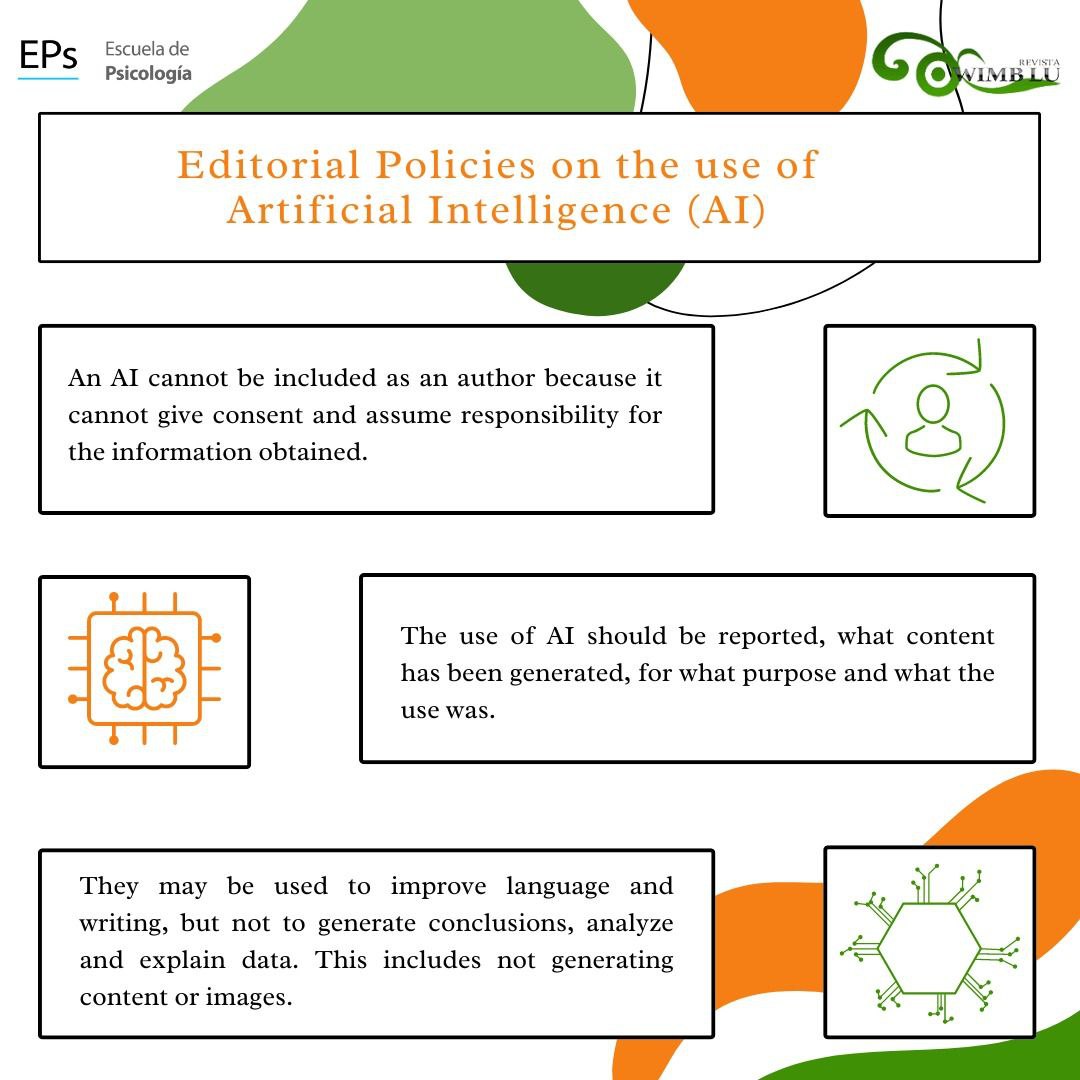
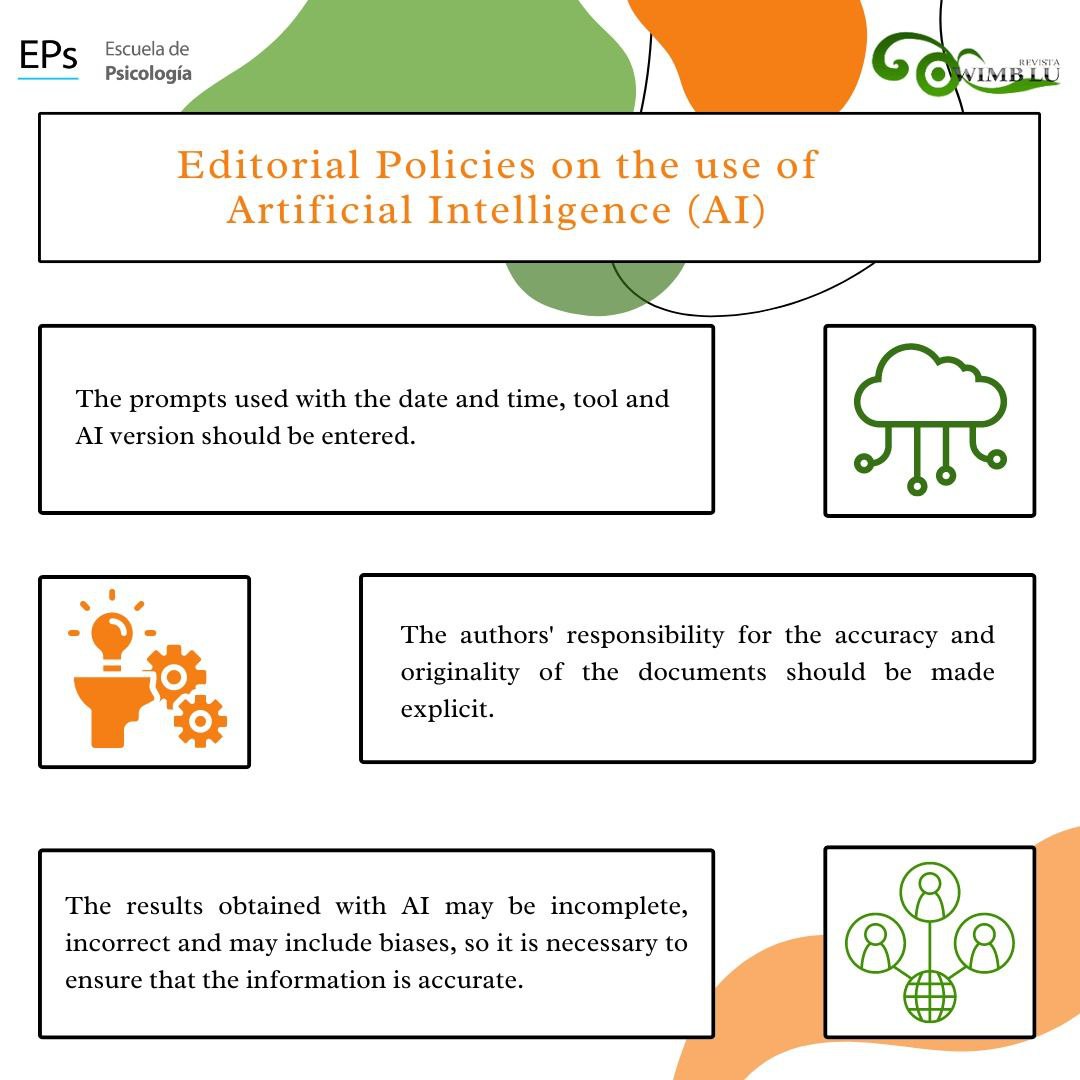
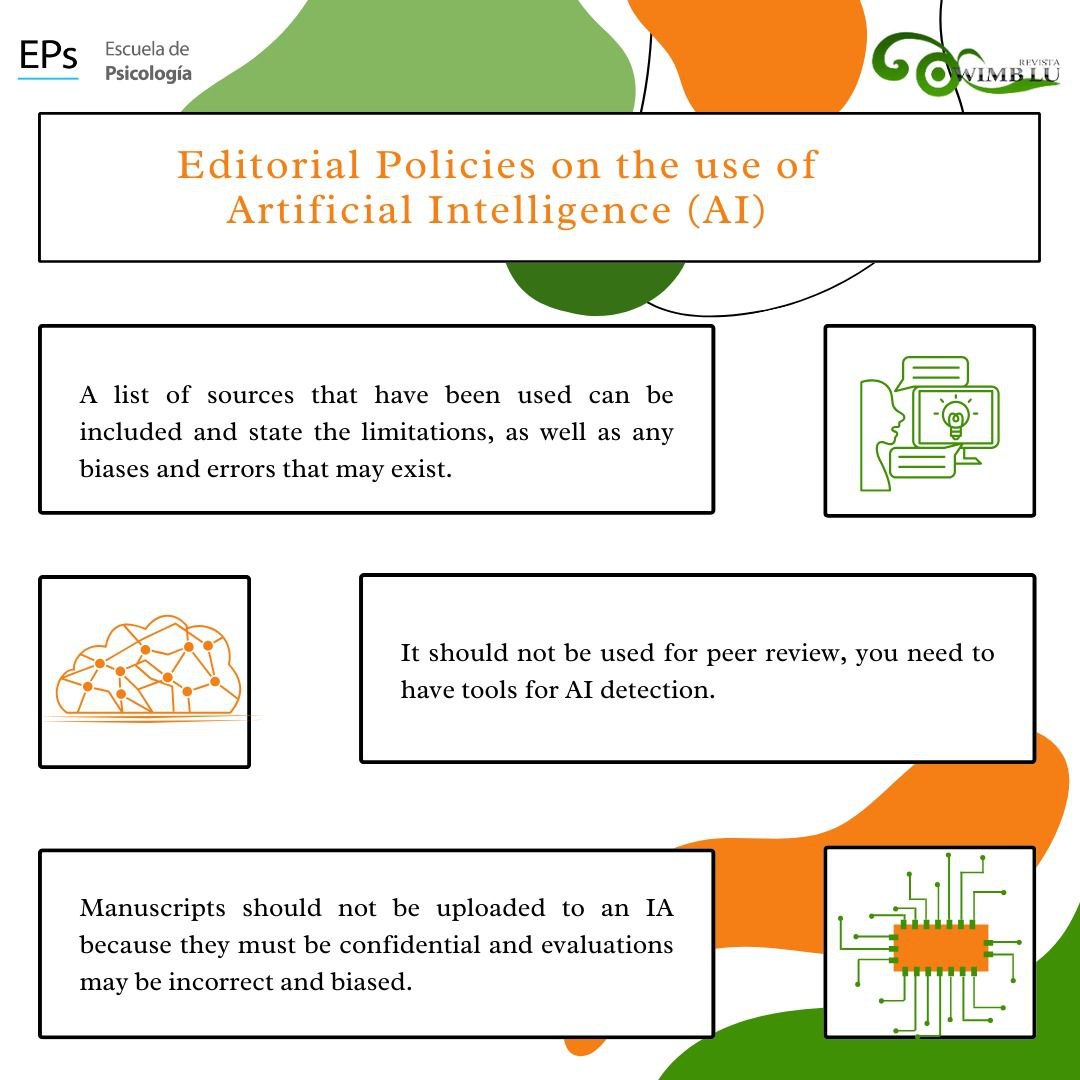
Sponsors
- Vicerrectoría de Investigación, Universidad de Costa Rica
Journal History
Wimb lu, electronic journal of students of the School of Psychology of the University of Costa Rica was born in 2005 as an academic-scientific space that allows the student population of national and international psychology, to publicize the results of their research throughout each school year, this in order to constitute an electronic means of consultation and systematization of information tending to the social projection sought by the university.
In particular, the School of Psychology of the University of Costa Rica, since 1999 began the process of evaluating its curriculum in order to obtain accreditation at the national level, achievement reached during 2004. Among the restructurings carried out, one of the most important was the collection and systematization of the research carried out in the academic spaces, both by the students and the collaborating teachers; In other words, the promotion of academic writing became essential as part of the training of professionals with awareness and knowledge in psychology.
The origin of this name for the magazine is collective. Its meaning goes in the direction of the commitment that is acquired with this publication, with the promotion and development of academic psychology in our university and internationally and also, with the search of dialogue with our invisible roots of knowledge, and of course, with the indigenous Bribri psychology of which the magazine bears his name.
Jara and García (2003) follow the idea that Wimb lu is a soul that is part of the body and remains with death, it is also called the soul of the liver because of its relationship with the world of emotions and desires and global understanding of things. It is related to the emotional soul that remains and for that reason our journal of psychology emerges as a permanent space to publish our scientific and social work.
Fundadores(as) Revista Wimb lu por orden alfabético:
Nancy Arias García
Fernando Barahona
María Díaz Madrigal
Leonor Gutiérrez
Damián Herrera González
Gustavo Morales
Ginette Sánchez Gutiérrez
Special thanks to Dr. Manuel Martínez Herrera for his support in the creation of Wimb lu de la revista Wimb lu while he was Director of the School of Psychology. Universidad de Costa Rica.

